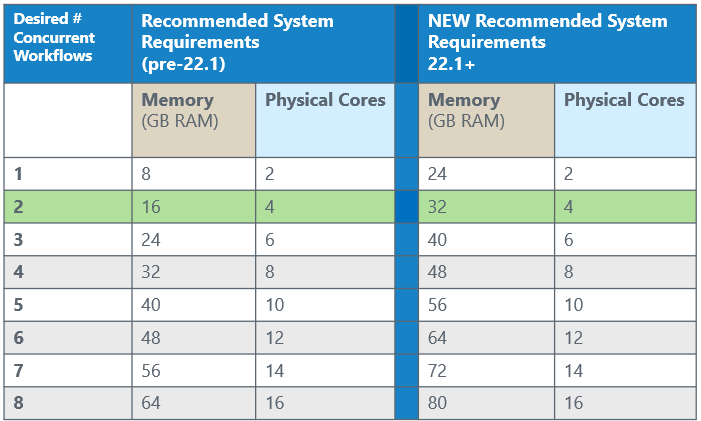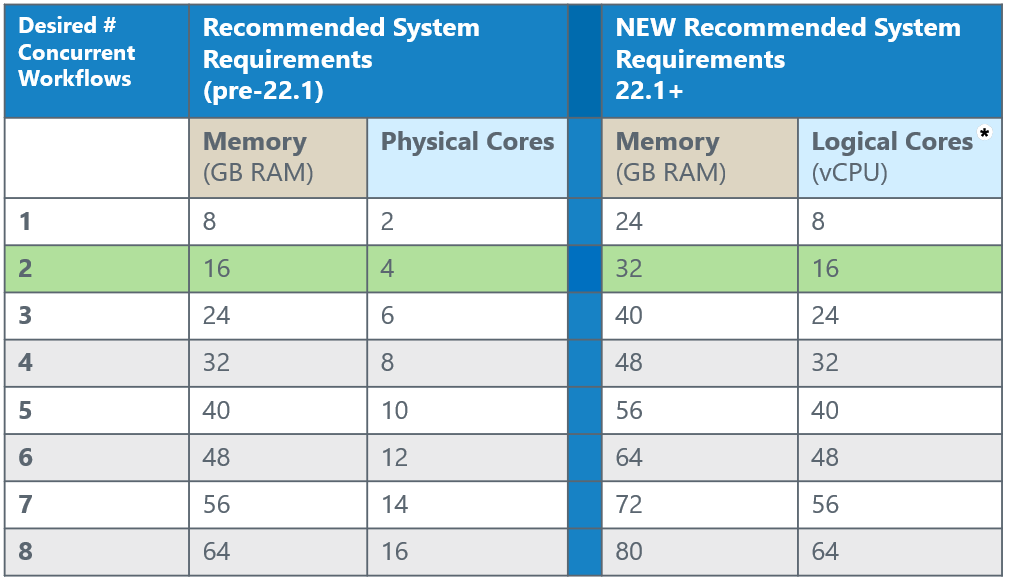Server is supported on desktop computers, stand-alone servers, and virtual machine environments with the following minimum requirements.
Minimum Requirements Per Server Node | Recommendations for Production Environments Per Server Node (Multi-Node Environment)* | |
|---|---|---|
CPU | Intel or AMD x86-64 (64-bit) | Intel Xeon E, Xeon W, AMD EPYC 7xx2, AMD Threadripper, or better |
Number of CPU Cores** | 4 cores (8 logical cores) per node Example Environment:
| 8+ cores (16+ logical cores) per node Example Environment:
|
System Memory | 16 GB | 32+ GB |
Recommended Minimum Disk Size | 500 GB | 1+ TB SSD |
*Enterprise Production Deployments vary per use case. For assistance assessing hardware sizing needs, talk to your Alteryx representative. Learn more in this whitepaper and our Configuration Page.
**This table assumes 1 physical core to be equal to 2 logical cores. For more information, please see our licensing definitions page.
We’ve separated our recommendations into 2 different categories: Minimum Hardware Requirements and Recommended Hardware for Optimal Performance.
Server minimum hardware requirements are defined as the minimum hardware needed to run a stable installation of Alteryx Server. If you don't meet minimum requirements, it puts you at risk of having poor performance and/or having the service shut itself down on any node where the engine runs.
The following minimum hardware requirements are recommended for desired number of concurrent workflows:

Note that the green highlighted line is the minimum recommended configuration. The line showing information for 1 concurrent workflow is helpful for you to understand how much you need to increase resources to add 1 additional job to the existing configuration.
Server optimal performance hardware recommendations are defined as the sweet spot in hardware where Server can complete workflows as efficiently as possible. This is useful to eliminate congestion on busy systems.
The following hardware recommendations are recommended for optimal performance:

*Logical cores are either vCPUs or logical cores within a physical core. The standardization to refer to logical cores is a way of comparing consistently across both physical on-prem servers and virtual servers in the cloud.
Windows Server 2012 End of Support
As of Server version 2023.2, Alteryx no longer supports Windows Server 2012 as it has reached the end of support by Microsoft. Go to Windows Server 2012 and 2012 R2 reaching end of support to learn more.
Microsoft Windows Server 2016 64-bit or later
Microsoft .NET Framework 4.6 or higher
Install Predictive Tools to run workflows that use the Predictive Tools on Server.
FIPS mode disabled.
Mongo DB
Server configuration requires MongoDB. MongoDB version 4.2 is embedded with Server 2021.3.6+.
Embedded MongoDB: If you are upgrading from a version prior to 2021.3.6, you must start with a version of Server that uses MongoDB 4.0 before you upgrade to 2021.3.6 version or higher. Versions of Server that use embedded MongoDB include 2019.3 through 2021.3.5.
For embedded MongoDB, the host, username, and password are automatically generated.
User-Managed: Server supports MongoDB versions 4.2, 4.4, 5.0, 6.0, and 7.0 for user-managed instances.
For user-managed MongoDB, specify the host, username, and password from your MongoDB instance.
If you were previously using SQLite for Alteryx Scheduler, jobs have to be manually re-scheduled when switching to MongoDB.
For more information, visit the MongoDB Schema Reference help page.
These are the default ports used by Server. You can customize Server ports if necessary.
Public | |
|---|---|
80 | AlteryxService, Non-SSL/TLS AlteryxServerHost (webserver), and AlteryxAuthHost (Authentication Service) |
443 | AlteryxServerHost (webserver) and AlteryxAuthHost (Authentication Service) with SSL/TLS |
27018 | Embedded MongoDB |
Loopback Only | |
|---|---|
5562 | AlteryxMetrics |
8700-8799 | Python for Insights |
Administrator Rights | Admin access to the host server's operating system or physical access to the server hardware is required to install Server. |
Active Directory Read Access | Read access to Active Directory, if you plan to use Integrated Windows Authentication. Visit the Server Authentication help page to learn more about authentication options. |
Access to Alteryx Licensing System | Ensure the computer can contact the whitelist.alteryx.com web domain used by the Alteryx licensing system. |
File Share Access | Read and write permissions to the file share. |
Alteryx Admin User | The Server administrator can manage users and workflows. A Default Server Admin is specified when configuring the authentication for the Server. Visit the Server Authentication help page to learn more about specifying a Default Server Admin. |
Run As User | In hardened server environments with restrictive permissions policies, you might need to enable Windows Server security permissions in support of run-as credentials. Configure Required Run As User Permissions. |
Base Address—The base address is the URL that users use to access the Server—the URL defaults to http://localhost/gallery/ which you can use to run the Server locally.
SMTP Server—SMTP host information is required for Server email notifications. Notifications and account validations are managed via email.